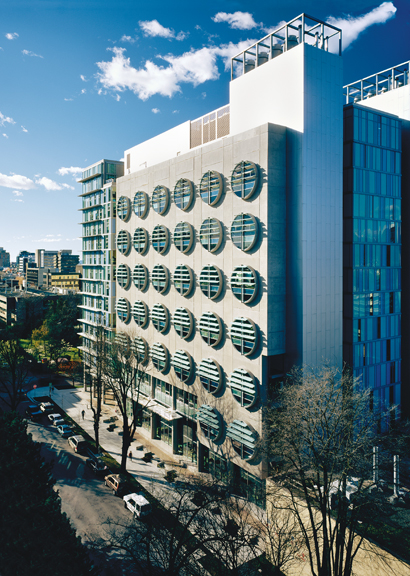Nature Communications
Karama Asleh, Gian Luca Negri, Sandra E Spencer Miko, Shane Colborne, Christopher S Hughes, Xiu Q Wang, Dongxia Gao, C Blake Gilks, Stephen KL Chia, Torsten O Nielsen, Gregg B Morin
Despite advances in genomic classification of breast cancer, current clinical tests and treatment decisions are commonly based on protein level information. Formalin-fixed paraffin-embedded (FFPE) tissue specimens with extended clinical outcomes are widely available. Here, we perform comprehensive proteomic profiling of 300 FFPE breast cancer surgical specimens, 75 of each PAM50 subtype, from patients diagnosed in 2008-2013 (n = 178) and 1986-1992 (n = 122) with linked clinical outcomes. These two cohorts are analyzed separately, and we quantify 4214 proteins across all 300 samples. Within the aggressive PAM50-classified basal-like cases, proteomic profiling reveals two groups with one having characteristic immune hot expression features and highly favorable survival. Her2-Enriched cases separate into heterogeneous groups differing by extracellular matrix, lipid metabolism, and immune-response features. Within 88 triple-negative breast cancers, four proteomic clusters display features of basal-immune hot, basal-immune cold, mesenchymal, and luminal with disparate survival outcomes. Our proteomic analysis characterizes the heterogeneity of breast cancer in a clinically-applicable manner, identifies potential biomarkers and therapeutic targets, and provides a resource for clinical breast cancer classification.
Cell Reports
Fraser D Johnson, et al. (including Gregg B Morin).
Phenotype-based screening can identify small molecules that elicit a desired cellular response, but additional approaches are required to characterize their targets and mechanisms of action. Here, we show that a compound termed LCS3, which selectively impairs the growth of human lung adenocarcinoma (LUAD) cells, induces oxidative stress. To identify the target that mediates this effect, we use thermal proteome profiling (TPP) and uncover the disulfide reductases GSR and TXNRD1 as targets. We confirm through enzymatic assays that LCS3 inhibits disulfide reductase activity through a reversible, uncompetitive mechanism. Further, we demonstrate that LCS3-sensitive LUAD cells are sensitive to the synergistic inhibition of glutathione and thioredoxin pathways. Lastly, a genome-wide CRISPR knockout screen identifies NQO1 loss as a mechanism of LCS3 resistance. This work highlights the ability of TPP to uncover targets of small molecules identified by high-throughput screens and demonstrates the potential therapeutic utility of inhibiting disulfide reductases in LUAD.
Cell Death and Differentiation
Sylvain Lefort, Amal El-Naggar, Susanna Tan, Shane Colborne, Gian Luca Negri, Davide Pellacani, Martin Hirst, Barry Gusterson, Gregg B Morin, Poul H Sorensen, Connie J Eaves
Breast cancer heterogeneity has made it challenging to identify mechanisms critical to the initial stages of their genesis in vivo. Here, we sought to interrogate the role of YB-1 in newly arising human breast cancers as well as in established cell lines. In a first series of experiments, we found that short-hairpin RNA-mediated knockdown of YB-1 in MDA-MB-231 cells blocked both their local tumour-forming and lung-colonising activity in immunodeficient mice. Conversely, upregulated expression of YB-1 enhanced the poor in vivo tumorigenicity of T47D cells. We then found that YB-1 knockdown also inhibits the initial generation in mice of invasive ductal carcinomas and ductal carcinomas in situ from freshly isolated human mammary cells transduced, respectively, with KRASG12D or myristoylated-AKT1. Interestingly, increased expression of HIF1α and G3BP1, two YB-1 translational targets and elements of a stress-adaptive programme, mirrored the levels of YB-1 in both transformed primary and established MDA-MB-231 breast cancer cells.
Cell Reports
Artem Babaian, Katharina Rothe, Dylan Girodat, Igor Minia, Sara Djondovic, Miha Milek, Sandra E Spencer Miko, Hans-Joachim Wieden, Markus Landthaler, Gregg B Morin, Dixie L Mager
The ribosome is an RNA-protein complex that is essential for translation in all domains of life. The structural and catalytic core of the ribosome is its ribosomal RNA (rRNA). While mutations in ribosomal protein (RP) genes are known drivers of oncogenesis, oncogenic rRNA variants have remained elusive. We identify a cancer-specific single-nucleotide variation in 18S rRNA at nucleotide 1248.U in up to 45.9% of patients with colorectal carcinoma (CRC) and present across >22 cancer types. This is the site of a unique hyper-modified base, 1-methyl-3-α-amino-α-carboxyl-propyl pseudouridine (m1acp3Ψ), a >1-billion-years-conserved RNA modification at the peptidyl decoding site of the ribosome. A subset of CRC tumors we call hypo-m1acp3Ψ shows sub-stoichiometric m1acp3Ψ modification, unlike normal control tissues. An m1acp3Ψ knockout model and hypo-m1acp3Ψ patient tumors share a translational signature characterized by highly abundant ribosomal proteins. Thus, m1acp3Ψ-deficient rRNA forms an uncharacterized class of “onco-ribosome” which may serve as a chemotherapeutic target for treating cancer patients.




